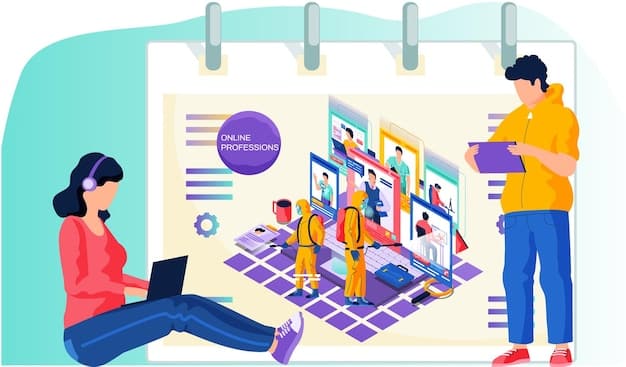Choosing the Right Online Learning Platform: Accreditation vs. Career Outcomes

Choosing the right online learning platform involves carefully weighing accreditation, which ensures quality and credibility, against career outcomes, which reflect the platform’s success in preparing students for professional opportunities.
Choosing an online learning platform can be overwhelming. This guide, titled How to Choose the Right Online Learning Platform: A Comparison of Accreditation and Career Outcomes, helps you navigate accreditation standards and career outcomes to make an informed decision.
Understanding Online Learning Platforms
Online learning platforms have revolutionized education, offering flexibility and accessibility. But with numerous options available, understanding their core aspects is crucial.
What are Online Learning Platforms?
Online learning platforms provide educational content and tools via the internet. They cater to diverse learners, offering courses, certifications, and degrees.
Benefits of Online Learning
Online learning offers numerous benefits, including convenience, affordability, and a wide range of course options. It allows students to learn at their own pace and schedule.
- Flexibility: Learn anytime, anywhere.
- Accessibility: Access courses from anywhere in the world.
- Affordability: Often more cost-effective than traditional education.
Online learning platforms offer a transformative educational experience. Understanding their benefits and key components is essential for making the right choice and achieving your academic and professional goals.

Accreditation: Ensuring Quality and Credibility
Accreditation is a critical factor when selecting an online learning platform. It ensures the quality and credibility of the education you receive.
What is Accreditation?
Accreditation is a process where an external body evaluates the quality of an educational institution or program. It confirms that the institution meets specific standards.
Types of Accreditation
There are two main types of accreditation: regional and national. Regional accreditation is typically more prestigious and is often preferred for academic programs, while national accreditation is common for vocational and trade schools.
- Regional Accreditation: Focuses on academic quality and transferability of credits.
- National Accreditation: Often seen in vocational and career-focused programs.
- Programmatic Accreditation: Specific to certain fields, like engineering or nursing.
Accreditation is vital for ensuring that your online learning platform meets quality standards. It impacts the credibility of your degree and its acceptance by employers and other educational institutions.
Evaluating Career Outcomes
Career outcomes are a vital consideration when choosing an online learning platform. They reflect the platform’s effectiveness in preparing students for professional success.
What are Career Outcomes?
Career outcomes refer to the employment rates, salary levels, and career advancement opportunities of graduates from a particular program or institution.
Key Metrics for Career Outcomes
Several metrics can help you evaluate career outcomes, including graduate employment rates, average starting salaries, and alumni success stories. Also, you can consider the opportunities to have internship or take part in research.
When assessing career outcomes, it’s essential to look beyond the numbers and consider the quality of career support services offered by the platform. A good platform will provide resources such as resume writing assistance, interview preparation, and job placement assistance.
The Importance of Career Services
Career services play a critical role in helping students transition from education to employment. Look for platforms that offer comprehensive career support.
- Resume Writing Assistance: Guidance on creating effective resumes.
- Interview Preparation: Mock interviews and tips for success.
- Job Placement Assistance: Connections to potential employers.
Focusing on career outcomes ensures that your online education investment pays off with tangible professional benefits. Good career services are essential to guide to the job that you always dreamt of.

Comparing Accreditation and Career Outcomes
Accreditation and career outcomes are both essential, but they serve different functions. Understanding their relationship will help you make a well-rounded choice.
The Relationship Between Accreditation and Career Outcomes
Accreditation provides a foundation of quality, while career outcomes measure the practical success of graduates. A strong, accredited program should ideally lead to positive career outcomes.
Balancing Accreditation and Career Outcomes
It is important to balance both accreditation and career outcomes when selecting an online learning platform. A highly accredited institution may not always guarantee the best career outcomes, and vice versa.
When evaluating online learning platforms, consider the specific industry you’re interested in. Some industries prioritize accreditation, while others focus more on practical skills and experience.
Industry-Specific Considerations
Different industries have varying priorities. Research what matters most in your field of interest.
- Healthcare: Accreditation is highly valued due to regulatory requirements.
- Technology: Practical skills and project experience may be more important.
- Business: A mix of accreditation and real-world application is ideal.
Balancing accreditation and career outcomes involves carefully considering your individual goals and the specific requirements of your industry. It’s about finding the right fit for your aspirations.
Making the Right Choice: Factors to Consider
Choosing the right online learning platform involves considering various factors beyond accreditation and career outcomes. Personal goals, program fit, and learning style are also important.
Personal Goals and Learning Style
Your personal goals and learning style should significantly influence your choice. Are you looking for a career change, skill enhancement, or a formal degree?
Program Fit and Curriculum
Carefully evaluate the program curriculum to ensure it aligns with your interests and career goals. Look for programs that offer relevant and up-to-date content, delivered in an engaging format.
Technology and Support
The technology used by an online learning platform can greatly impact your learning experience. Also, consider the support and interaction that a program can give you.
- User-Friendly Interface: Easy navigation and access to materials.
- Technical Support: Reliable assistance with technical issues.
- Community and Interaction: Opportunities to connect with instructors and peers.
Making the right choice involves a holistic evaluation of your needs, goals, and learning preferences. By considering all these factors, you can find an online learning platform that sets you up for success.
Success Stories: Real-World Examples
Examining success stories can provide valuable insights into the potential outcomes of different online learning platforms. Real-world examples highlight the possibilities.
Examples of Successful Graduates
Success stories can inspire and inform your decision-making process. Look for alumni testimonials and case studies that showcase the impact of online education on career trajectories.
Case Studies of Career Advancement
Case studies provide detailed accounts of how graduates have leveraged their online education to advance their careers. Stories can tell you a lot about a program.
Many graduates have successfully transitioned to new careers after completing online programs. For example, a marketing professional might earn a data analytics certification and transition to a data-driven role.
Career Transitions and Transformations
Online education can facilitate significant career transitions and transformations. This helps you find new opportunities.
- Marketing to Data Analytics: Leveraging online certifications for a career shift.
- Teaching to Curriculum Design: Applying educational skills in a new context.
- Healthcare to Health Informatics: Combining medical knowledge with technology.
Success stories and case studies offer a compelling glimpse into the transformative potential of online learning. They demonstrate how individuals have successfully leveraged online education to achieve their career aspirations.
| Key Aspect | Brief Description |
|---|---|
| 🎓 Accreditation | Ensures educational quality and credibility. |
| 💼 Career Outcomes | Reflects graduate employment and career success. |
| 🎯 Personal Goals | Align your learning with your aspirations. |
| 💻 Technology | User-friendly platforms enhance learning. |
Frequently Asked Questions
▼
Regional accreditation focuses on academic quality and is often preferred. National accreditation is common for vocational programs and career skills.
▼
Career outcomes reflect how well a platform prepares students for employment. Positive career outcomes indicate a successful program.
▼
Ensure the curriculum aligns with your career goals. Look for up-to-date content taught in an engaging and effective format which suits your learning style.
▼
Technology can greatly impact online learning. User-friendly interfaces and reliable technical support are crucial for a good learning experience.
▼
Ideally, balance both. Accreditation ensures quality, while career outcomes highlight practical success. Choose what aligns with your specific goals.
Conclusion
Choosing the right online learning platform involves a comprehensive approach. Consider accreditation, career outcomes, personal goals, and program fit to make a decision that aligns with your future aspirations.





